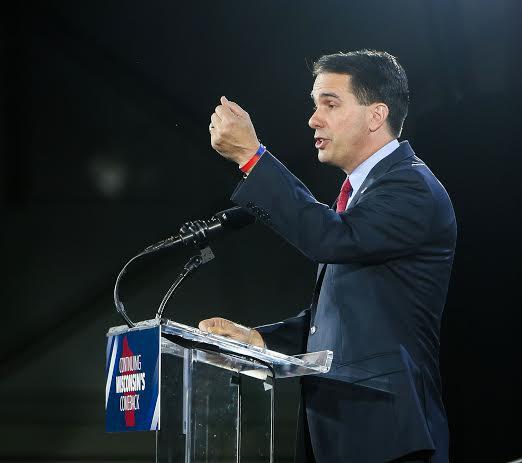Superintendent of Public Instruction Tony Evers and Gov. Scott Walker have been battling it out in the 2018 gubernatorial election, with education being a topic of contention.
Dennis L. Dresang, Professor Emeritus of Public Affairs and Political Science and founding director of the La Follette School of Public Affairs at University of Wisconsin, considered Walker’s history in the education sector to be very divisive.
When Walker first took office, he noted public school teachers as being overpaid and underworked, Dresang said.
Dresang cited Walker’s 2011 Act 10 as a piece of legislation which has received media and general public attention, both previously and again during the current election.
The act, among other things, limited collective bargaining rights of teacher unions and redacted funding for public education. Dresang said it served as a key point of contention between Walker and those in the public education sector, with teachers’ health care costs soaring and a lawsuit being filed this past February, claiming Act 10 violates free speech.
“There were big demonstrations and protests,” Dresang said. “People were very concerned about public education generally under Walker, but more specifically the divisions he was creating by depicting teachers as the enemy.”
Where this comes into play in the 2018 election, Dresang said, is how he believes Walker has altered his positions. Over the years, Dresang said Walker had been backtracking on public education, whereas he now wants to put more money towards the issue.
Trailing in polls, Walker urges College Republicans to spread message on campus
John Witte, Professor Emeritus of Public Affairs and Political Science at UW and Faculty Affiliate at the Institute for Research on Poverty, said that Walker’s position on higher education is obvious.
“His policies on higher education seem pretty clear,” Witte said. “He’s tried, in his administration, to keep tuition constant.”
Throughout Walker’s tenure as governor, he has frozen tuition at all of the UW System campuses for six years in a row, with plans to extend the freeze for an additional four. This marks the first multi-year tuition freeze in UW System history.
But Witte said this policy has an unintended consequence that concerns people from both the Democratic side and within his own party.
“Traditionally in the state of Wisconsin, Republicans have been the people who wanted to put money into the roads,” Witte said. “Democrats have tried to raid road funds in order to do more for social issues. I-90 is even downright dangerous — the accident rate there has doubled in the past few years.”
Witte said this issue becomes more relevant when conversations arise about where tuition funding could go. If tuition costs are raised, that money could be put towards fixing the roads which is something he claimed many people from different political sides want accomplished.
Dresang said Walker, backtracking from previous statements, also appears to now be in favor of the state funding two-thirds of K-12 education, which is something former governor Patrick Lucey introduced and former governor Tommy Thompson held onto before it was dismantled by successor Jim Doyle, Dresang said.
Evers, Dresang said, has always been in favor of this policy.
When it comes to Evers, Dresang said he has certain blocks of support that have kept him in office as Superintendent.
“Evers is superintendent, a nonpartisan job … Having said that, Evers, like a lot of predecessors, is in office primarily because he gets the support of teacher unions and Democrats,” Dresang said. “It’s, in fact, more partisan than the Constitution would lead you to believe.”
He added that Evers supports both investing more into the UW system and allowing people to refinance their student loans, statements corroborated by Evers’ campaign site.
Dresang believed a lot of the interest in education funding in the state comes from sources other than concerns about the classroom.
“I think that people’s feelings are driven [more] by what’s happening … with funding, and it’s related to property taxes,” Dresang said. “The main way we fund public education is through property tax: how can we fund public education without property taxes going through the roof?”
Witte said it was important to note that Evers has been involved in the K-12 establishment for his entire career, which is why people within the establishment think very highly of him.
Tony Evers discusses school funding, future of WI public school system
Witte added that another challenge for Walker is the fact that he is running for re-election for his third term, which he stated is not an easy term to win.
Regardless, for some, the candidate’s individual policies, education or otherwise, may have little to no effect on how they vote, Witte said. He stated some people will not be swayed and different regions of Wisconsin will vote for the types of candidates they would vote for typically.
This means the North Shore will sway towards Walker, while Madison will swing Evers, Witte said. It is a small fraction — “maybe 5 percent” — of the undecided voters who Witte believes will decide this election.
Witte also added both Evers and Walker have run relatively neutral campaigns, making it harder to tell who has the edge.
“[The ads] have been fairly issue-oriented, [they] haven’t been direct attacks on each other … They’re upstanding characters, but neither is a rockstar out there,” Witte said. “Nobody’s got that flamboyant personality that would attract people to them like moths to a lightbulb.”
The gubernatorial election, along with the Class I U.S. Senate seat and other state and local elections, will occur Nov. 6, 2018.













